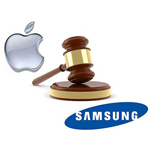
The South Korean tech giant, Samsung, charged Apple on Wednesday, November 21, 2012, that Apple's iPad Mini infringes eight patented technologies.
Samsung also sued Apple's 7.9-inch tablet and and the fifth-generation iPod Touch to the list of products it claims violate patents.
Samsung has asked the United States District Court for the Northern District of California for permission to add several recently announced Apple devices along with a few earlier models to an earlier complaint that alleges various infringements. The iPad Mini, along the fourth-generation iPad, the newest iPod touch and three earlier versions of the iPod touch, and all are said to be infringing the same patents Samsung cited earlier in the case. Samsung’s motion to add the six new devices has not yet been granted and the trial is scheduled to begin on January 8th, 2013.
Samsung essentially claims that "all Apple products including the radio signalling technology, the built-in speaker and the external audio output port" infringe this particular patent, and thus argues that the newest Apple products should be included in the case.
Samsung previously moved to expand the case to include the iPhone 5, which Apple released after the initial suit was filed. The court agreed on November 15.
Apple previously claimed that several Samsung devices, including Galaxy S3 and Galaxy Nexus smartphones, infringe its patents. The current case is separate from a similar lawsuit that concluded in August with a verdict in Apple's favor that, should it withstand challenge, would require Samsung to pay more than $1 billion to its rival. The American tech giant later lost a heated patent battle against Samsung in U.K. courts where Samsung was appealing the verdict this past July.
The case was brought by Samsung, follows a victory earlier this week when a court ordered Apple to disclose details of its patent-sharing deal with a Taiwanese handset maker, HTC. The order to give Samsung access to details of Apple's deal with HTC may have a big impact on the legal battle between Samsung and Apple.
Samsung asked the courts to order Apple to reveal the information because it was "almost certain" the deal covered some of the patents at the centre of its dispute with Apple. It seeks to show Apple is willing to license its technology if the price is right.
The court ordered Apple to produce a full copy of the settlement agreement "without delay", though it will only be revealed to Samsung’s legal team. It has been speculated that HTC has agreed to pay Apple a royalty of up to $8 on each smartphone it sells. However, the firm’s Chief Executive firmly denied that figure.
The settlement of Apple and HTC ended their worldwide litigation and brought to a close one of the first major flare-ups in the global smartphone patent wars.
Apple first sued HTC in 2010, setting in motion a legal conflagration that has since circled the globe and engulfed the biggest names in mobile technology.
Apple and Samsung are due back in court on December 6th for follow-up action on their earlier trial. Some of the issues at stake in that hearing include Apple's request to ban U.S. sales of at least eight Samsung devices and Samsung's motion to toss out the jury verdict entirely.
Both firms are seeking to ensure the others' most recent products are drawn into the fight, which could lead to sales bans. Last week Apple successfully applied to add Google’s most recent mobile operating system, Android 4.2, Jelly Bean, to the case.